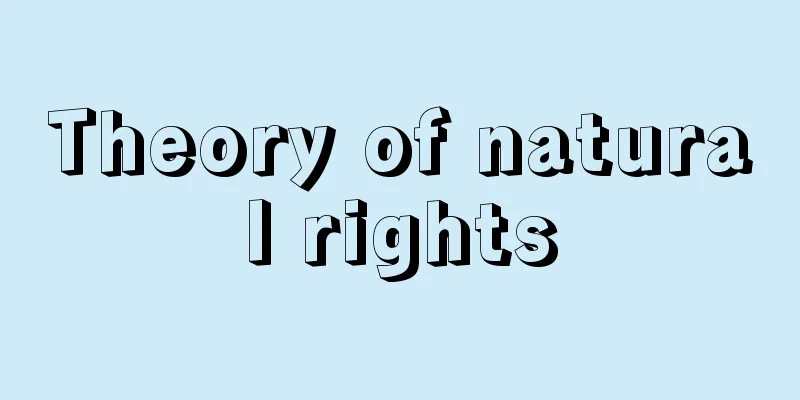Theory of natural rights

|
A translation of the idea of natural right, which was advocated in the West as a democratic political principle at the time of the establishment of modern nation states in the 17th and 18th centuries. It is a Japanese version of human rights and national thought that combines the social contract theory with the Confucian ideas of nature and heaven. Yukichi Fukuzawa and Hiroyuki Kato used this term to call for the abolition of feudal class systems and to justify the Meiji government as a government established with the consent of free and equal people. However, as it became clear that the Meiji government was in fact a clan-based government and the Freedom and People's Rights Movement, which called for the establishment of a national parliament and the acquisition of suffrage, gained momentum, Kato became a denier of the theory of natural rights. Kato's change of heart was partly due to his own service in the Meiji government, but more likely due to his weak understanding of the theory of natural rights. In the West, the social contract theory considered that people's political participation was essential to better guarantee individual rights and freedom, which promoted the development of parliamentary politics. In response, Kato argued that it was premature to grant suffrage in a country with a backward civilization like Japan, and he took a critical stance against the establishment of the National Diet. In his New Theory of Human Rights (1882), he used the evolutionary theory of the struggle for existence, survival of the fittest, and natural selection to argue that humans are born unequal, and that the social contract theory, which says that free and equal humans established a government through contract, is a delusion, and he rejected the idea of natural human rights itself. The so-called "New Theory of Human Rights Debate" developed over this issue between Kato, Emori Ueki, Tatsui Baba, Fumio Yano, and Masakazu Toyama. After that, the Constitution of the Empire of Japan, modeled after the Prussian Constitution, was enacted, and feudal ideas of loyalty and filial piety based on Confucian morality became popular again, and the idea of natural human rights was largely defeated by nationalistic ideas. [Hiroshi Tanaka] [Reference] |Source: Shogakukan Encyclopedia Nipponica About Encyclopedia Nipponica Information | Legend |
|
17、18世紀の近代国家成立時に民主主義政治原理として欧米において唱えられた自然権natural right思想の訳語。社会契約説に儒教の自然や天の理念を結び付けて構成した日本版人権・国家思想。福沢諭吉(ゆきち)や加藤弘之(ひろゆき)は、この語を用いて封建的身分制の打破を叫び、明治政府は自由・平等な人民の同意によって設立された政権であるとしてその正当性を弁証した。しかし、明治政府の実態が藩閥政府であることが明らかとなり、国会開設や参政権の獲得を求める自由民権運動が高揚するなかで、加藤は天賦人権論の否定者となった。こうした加藤の転向は、彼自身が明治政府に仕えたことにもよるが、それよりも彼の天賦人権論理解の弱さにその原因を求めることができる。そもそも欧米の社会契約説においては、個人の権利・自由をよりよく保障するためには人民の政治参加が不可欠であると考えられ、そのことが議会政治の発達を促した。これに対し、加藤は、日本のような文明の遅れた国では選挙権の賦与は時期尚早であると主張し、国会開設に批判的態度をとった。そして『人権新説』(1882)では、生存競争、適者生存、自然淘汰(とうた)という進化論を用いて、人間は生来不平等に生まれついていること、したがって自由・平等な人間が契約によって政府を設立したという社会契約説は妄想であるとして、天賦人権論そのものを否定してしまった。これをめぐって加藤と植木枝盛(えもり)、馬場辰猪(たつい)、矢野文雄、外山正一(とやままさかず)らとの間でいわゆる「人権新説論争」が展開された。その後プロイセン憲法に範をとった大日本帝国憲法が制定され、儒教道徳に基づく封建的な忠孝思想がふたたび隆盛となるなかで、天賦人権思想は国家主義思想の前に大きく後退してしまった。 [田中 浩] [参照項目] |出典 小学館 日本大百科全書(ニッポニカ)日本大百科全書(ニッポニカ)について 情報 | 凡例 |
<<: Transfer order - Temporary order
Recommend
Melanosis faciei feminina (English spelling)
...Systemic melanosis is seen in patients with ar...
Carmania - Carmania
...Population: 350,000 (1994). Also called Kirman...
Lake Yamanaka
It is one of the Fuji Five Lakes, located in Yama...
Board of Education (USA) - Kyoiku Iinkai
…As a result, school systems and the number of ye...
Victory argument - Katsuron
(Noun) (Translation of Vaiśeṣika) A school of Indi...
inertial mass
…The acceleration caused by a force of the same m...
Tinea cruris (Jock itch)
What is the disease? Occurs in the groin area Tin...
Nusaybin
…An ancient city in southeastern Asia Minor. Curr...
Rifle - shoju (English spelling) rifle
A general term for military portable firearms wit...
Kawajiri Seitan
1876-1954 A theater critic from the Meiji to Show...
Unclaimed Buddha - Muenbotoke
The term refers to spirits other than the legitim...
Wilken, U.
…History is a complementary field to the study of...
Tibicininae
…The subfamily Cicadas with complete sound organs...
Dissecting aneurysm of aorta
Aortic aneurysm is a disease in which the tunica m...
Delonix regia (Poinciana regia); royal poinciana; peacock flower; flamboyant
A deciduous tall tree of the legume family, also k...









